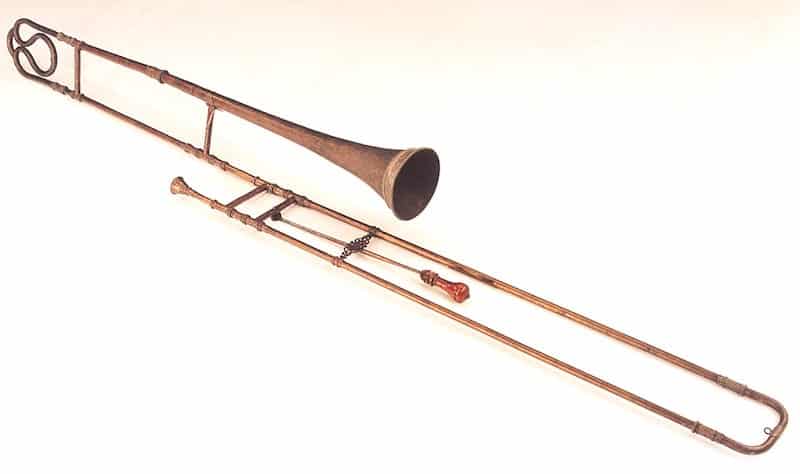Are Trombones Concert Pitch?
Ok, buckle up everybody... we're going to talk about transposing instruments. This topic is an endless source of confusion. Why do some instruments play in different keys? Which instruments play in what keys? I will be answering all these questions and more in this article. First things first, are trombones in concert pitch?
Yes! Trombones are in concert pitch, they do not transpose. Even though the trombone is a Bb instrument, it does not transpose. Bb is just the fundamental note of the instrument.

A Brief History of Trombone

The trombone is a musical instrument in the brass family. It has a telescoping slide mechanism that varies the length of the instrument to change the pitch of the notes it produces. The trombone has a distinctive, mellow sound and is a staple in many types of music, including classical, jazz, and brass bands.
The history of the trombone can be traced back to the 15th century, where it was known as the "sackbut." This early version of the trombone was smaller and had a more limited range than the modern trombone. The sackbut was primarily used in religious music and was a popular instrument in church choirs. If you are interested in taking music lessons, check out our music lessons in Ann Arbor.
During the Renaissance, the sackbut began to evolve and by the 17th century, it had become the trombone we know today. The slide mechanism was added to the instrument, allowing for greater flexibility in pitch and a wider range of notes. The trombone became a popular instrument in orchestral music, particularly in the works of composers such as Bach and Mozart.

In the 19th century, the trombone became a popular instrument in brass bands. The instrument's rich, full sound made it a perfect addition to military and marching bands. The trombone also became a popular solo instrument, and many composers wrote concertos and other solo pieces for the trombone.

In the 20th century, the trombone became an important part of jazz music. Jazz musicians such as Tommy Dorsey, J.J. Johnson, and Slide Hampton helped to establish the trombone as an important voice in jazz music. The trombone's unique sound and versatility make it a popular instrument in many different types of music, from classical to rock and roll.
As a music teacher, teaching trombone is a great way to introduce students to the world of brass instruments. The trombone is relatively easy to play and has a wide range of notes, making it a versatile instrument for students to learn. It is also a great introduction to music theory, as the slide mechanism allows for easy demonstration of how pitch is affected by changes in length.
In addition to learning to play the instrument, students will also learn the importance of proper breathing and posture, as well as how to read sheet music. As students progress in their trombone skills, they can also learn about different styles of music and how the trombone is used in those styles. Overall, learning trombone is a great way for students to develop a love for music and to gain a deeper understanding of the technical aspects of playing an instrument.
Top 3 Living Trombonists
Here's a few of my favorite trombonists who are currently playing!
- Wycliffe Gordon
Wycliffe Gordon is a highly accomplished jazz trombonist and composer from Waynesboro, Georgia. He began his musical journey at an early age, playing the trumpet in his school band. He quickly transitioned to the trombone, and by the age of 12, he was performing with local jazz bands.
Gordon attended Howard University in Washington, D.C., where he studied music and was a member of the renowned Howard University Jazz Ensemble. He graduated in 1990 and went on to tour with various jazz groups, including the Lincoln Center Jazz Orchestra and the Wynton Marsalis Septet.
In the 1990s, Gordon released several albums as a bandleader, including "The Introduction," "Dig This," and "Hi-Ya!" He also recorded several albums with the Lincoln Center Jazz Orchestra and appeared on several other albums as a sideman. His performances are noted for his high energy, and his ability to incorporate elements of funk and R&B into his playing.
Gordon has also been a prolific composer and arranger, and his compositions have been performed by various jazz orchestras, including the Lincoln Center Jazz Orchestra, the Carnegie Hall Jazz Band, and the Jazz at Lincoln Center Orchestra. He has also composed music for films and television shows.
In addition to his work as a performer and composer, Gordon is also a dedicated educator, and he has taught music at several institutions, including the Manhattan School of Music and the Juilliard School. He also leads workshops and clinics around the world.
Gordon has received numerous awards and accolades for his contributions to jazz, including the National Endowment for the Arts Jazz Master award, which is the highest honor that the United States government bestows on jazz musicians. He has also been honored by the International Association of Jazz Educators and the New York State Council on the Arts.
- Phil Wilson
Check out this incredible classic solo by the great Phil Wilson!
- Trombone Shorty
Trombone Shorty, also known as Troy Andrews, is a highly accomplished jazz trombonist, trumpet player, and singer-songwriter from New Orleans, Louisiana. He was born in 1986 and began playing music at a young age, starting with the trumpet and later transitioning to the trombone. His nickname "Trombone Shorty" came from his younger brother James Andrews, who would call him "Shorty" because he was the youngest member in the Andrews family brass band.
As a child prodigy, Andrews began performing with various brass bands in New Orleans, including the Dirty Dozen Brass Band and the Rebirth Brass Band. He also performed on the streets of New Orleans with his brother James, who is a trumpeter. By the age of six, he had already appeared on stage with Bo Diddley, and by age 12, he had played at the New Orleans Jazz and Heritage Festival with his own band, Trombone Shorty and Orleans Avenue.
In 2005, Andrews formed his own band, Trombone Shorty & Orleans Avenue, which quickly gained popularity and critical acclaim for their energetic performances and blending of various musical genres, including jazz, funk, rock, and R&B. The band has released several albums, including "Backatown," "For True," and "Say That to Say This," and has toured extensively in the U.S. and internationally.
In addition to his work with Orleans Avenue, Andrews has also collaborated with a wide range of artists from various genres, including Lenny Kravitz, Jeff Beck, and Macklemore. He has also appeared on several television shows, including "The Tonight Show with Jay Leno," "Late Show with David Letterman," and "The Ellen DeGeneres Show."
Andrews has also been actively involved in various philanthropic efforts, particularly in his hometown of New Orleans. He established the Trombone Shorty Foundation to provide music education and mentorship to young musicians in the city. He also works with the New Orleans Jazz and Heritage Foundation to preserve the city's musical heritage and promote cultural tourism.
Over the years, Trombone Shorty has received numerous awards and accolades, including a Grammy nomination and multiple DownBeat Beat Award wins. He has also been named the "Ambassador of New Orleans Music" by the city's mayor, and has been honored by the National Endowment for the Arts and the Louisiana Governor's Office of Cultural Development.
I hope have enjoyed this article and learned a thing or two about trombones. So just remember, trombone is a concert pitch instrument... it's also a super funky instrument! Thank you for reading all the way to the end.



